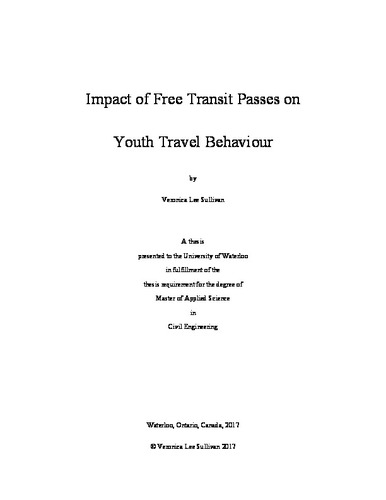| dc.contributor.author | Sullivan, Veronica Lee | |
| dc.date.accessioned | 2017-08-24 19:03:25 (GMT) | |
| dc.date.available | 2017-08-24 19:03:25 (GMT) | |
| dc.date.issued | 2017-08-24 | |
| dc.date.submitted | 2017-08-21 | |
| dc.identifier.uri | http://hdl.handle.net/10012/12199 | |
| dc.description.abstract | Young adults are often restricted in their activity participation and mobility by parental constraints and driving age restrictions. Public transit can, however, be a viable option for youth to accomplish their trips independently without an adult chaperone. To improve transit accessibility and availability, Kingston, Ontario developed a pilot program targeted to high school students. Since 2010, the City of Kingston has provided high school students with a complimentary transit pass to encourage high school students to travel by public transit and to enhance independent travel behaviour.
This thesis investigated how the complimentary transit pass program influenced transit ridership and households’ ability to meet their transportation needs. A literature review found very few studies for high school students. The approach utilized ridership data provided by Kingston Transit to identify ridership trends and locations where students are travelling the most. Also, a series of in-person and online surveys were distributed to graduating students, grade 9 students and parents to explore the impact of the transit pass program. By conducting surveys with local high school students and parents, this research examined the individual and household travel patterns and assessed the impacts of the pilot program.
The study found that grade 12 students on average use the transit pass three times more frequently than grade 9 students, which suggested that as students become older and gain experience with transit, they become more frequent transit users. The surveys provided evidence that the transit pass facilitated more independent trips and helped students participate in more activities. Also, parents’ perceptions indicated that there are spatial constraints on their children’s independent mobility and that age was a determining factor on how far they can travel alone. The research study concluded that the transit pass was an important stimulant for travel independence for high schools students and the program could be applied to other mid-sized North American municipalities. | en |
| dc.language.iso | en | en |
| dc.publisher | University of Waterloo | en |
| dc.subject | Travel Behaviour | en |
| dc.subject | Youth | en |
| dc.subject | Transit Pass | en |
| dc.subject | Public Transit | en |
| dc.subject | Independent Mobility | en |
| dc.title | Impact of Free Transit Passes on Youth Travel Behaviour | en |
| dc.type | Master Thesis | en |
| dc.pending | false | |
| uws-etd.degree.department | Civil and Environmental Engineering | en |
| uws-etd.degree.discipline | Civil Engineering | en |
| uws-etd.degree.grantor | University of Waterloo | en |
| uws-etd.degree | Master of Applied Science | en |
| uws.contributor.advisor | Casello, Jeffrey | |
| uws.contributor.affiliation1 | Faculty of Engineering | en |
| uws.published.city | Waterloo | en |
| uws.published.country | Canada | en |
| uws.published.province | Ontario | en |
| uws.typeOfResource | Text | en |
| uws.peerReviewStatus | Unreviewed | en |
| uws.scholarLevel | Graduate | en |

